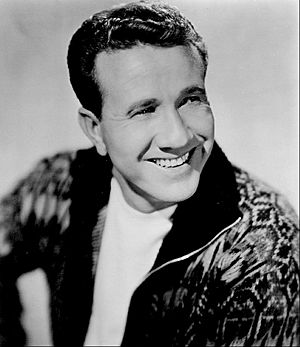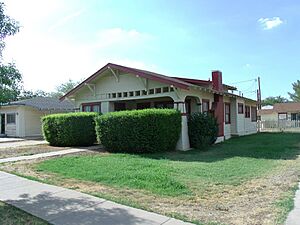Marty Robbins facts for kids
Quick facts for kids
Marty Robbins
|
|
|---|---|

Robbins in 1966
|
|
| Born |
Martin David Robinson
September 26, 1925 Glendale, Arizona, U.S.
|
| Died | December 8, 1982 (aged 57) Nashville, Tennessee, U.S.
|
| Occupation |
|
| Years active | 1948–1982 |
| Spouse(s) |
Mari Baldwin
(m. 1948) |
| Children | 2 |
| Musical career | |
| Genres |
|
| Instruments |
|
| Labels | Columbia, Decca |
| Associated acts |
|
| Signature | |
 |
|
Marty Robbins (born Martin David Robinson, September 26, 1925 – December 8, 1982) was an American singer, songwriter, and actor. He was also a NASCAR race car driver. Marty Robbins was one of the most popular country and western singers for nearly 40 years. His career lasted from the late 1940s to the early 1980s. He was also known as an early pioneer of "outlaw country" music.
Born in Glendale, Arizona, Marty Robbins learned to play guitar during World War II. He was serving in the United States Navy at the time. After the war, he became famous performing in clubs near his hometown. In 1952, he had his first number one country song, "I'll Go On Alone". He had many more hits, including "Singing the Blues", "A White Sport Coat", and "The Story of My Life".
In 1959, Robbins released his most famous song, "El Paso". He won a Grammy Award for this song. "El Paso" started his connection with western ballad songs, which became a big part of his music. Other popular songs include "Don't Worry", "Big Iron", and "Devil Woman". His song "Honkytonk Man" was the title for a 1982 Clint Eastwood movie, where Robbins also made his last acting appearance.
Marty Robbins recorded over 500 songs and 60 albums during his career. He won two Grammy Awards and was chosen for the Country Music Hall of Fame. He was also named the Artist of the Decade for the 1960s by the Academy of Country Music. His songs "El Paso" and "Big Iron" are considered among the top 100 Western songs ever. Many famous artists like Johnny Cash and Elvis Presley have covered his songs. His music is still popular today and appears in movies, TV shows, and video games.
Contents
Early Life and Beginnings
Marty Robbins was born Martin David Robinson on September 26, 1925. He grew up in Glendale, Arizona, which is a suburb of Phoenix. His parents divorced when he was 12 years old.
One of his favorite childhood memories was listening to stories. His grandfather, 'Texas Bob' Heckle, told him many tales about the American West. His grandfather was a traveling salesman and storyteller.
Robbins once said, "A lot of the songs I've written were brought about because of stories he told me. Like 'Big Iron' I wrote because he was a Texas Ranger. At least he told me he was."
Before joining the Navy, Robbins left high school. He worked many different jobs, like digging ditches and driving trucks.
At age 17, Robbins joined the United States Navy during World War II. He was stationed in the Solomon Islands in the Pacific Ocean. To pass the time, he learned to play the guitar. He also started writing songs and developed a love for Hawaiian music.
After leaving the military in 1947, he started playing music in Phoenix. In the early 1950s, Marty hosted his own radio show on KTYL. He then had his own TV show called "Western Caravan" on KPHO-TV. A famous singer named Little Jimmy Dickens saw Robbins on his TV show. Dickens helped Robbins get a record deal with Columbia Records.
Music and Racing Career
Marty Robbins became very well-known for his performances. He often appeared at the Grand Ole Opry in Nashville, Tennessee.
In 1980, he was featured on the TV music show Austin City Limits. Besides his music, Robbins loved race car driving. He competed in 35 NASCAR races. He finished in the top 10 six times.
In 1967, Robbins even played himself in a car racing movie called Hell on Wheels. He often raced Dodge cars prepared by famous NASCAR mechanic Cotton Owens. His last race was in November 1982, just a month before he passed away.
Film Appearances
Marty Robbins appeared in several films, often playing a musician or a character connected to the Old West or racing.
- The Badge of Marshal Brennan (1957) as Felipe, a Mexican outlaw
- Raiders of Old California (1957) as Timothy Voyle
- Buffalo Gun (1958) as Marty Robbins, a lawman
- The Ballad of a Gunfighter (1963) as Marty Robbins, an outlaw
- Country Music Caravan (1964) as Himself, singing
- Tennessee Jamboree (1964) as Himself, singing
- Road to Nashville (1966) as Himself, singing
- Hell on Wheels (1967) as Marty, a race car driver
- From Nashville With Music (1969) as Himself, singing
- Country Music (1972) as Himself, touring as singer and race car driver
- Guns of a Stranger (1973) as Mathew Roberts
- Honkytonk Man (1982) as Smoky, a recording session singer
Later Life and Passing
Marty Robbins had heart problems from a young age. He had his third heart attack on December 2, 1982. Doctors performed surgery to help his heart. However, he did not recover and passed away six days later, on December 8, at age 57. He died in Nashville.
Musical Achievements and Recognition
While Marty Robbins became known for his western music, his early hits were more like pop songs. Songs like "Singing the Blues" and "A White Sport Coat and a Pink Carnation" were very popular with teens. "A White Sport Coat" sold over a million copies.
He won a Grammy Award in 1959 for his famous song "El Paso". This song was his first to reach number one on the pop music charts. His song "Don't Worry" also became a big hit in 1961.
Interestingly, during the recording of "Don't Worry," a special guitar sound was created by accident. The guitarist's instrument was plugged into a faulty mixing console. This created a "fuzz" sound, which Robbins decided to keep in the song. This sound became famous in music.
Robbins won another Grammy Award in 1961 for his album More Gunfighter Ballads and Trail Songs. In 1970, he won a Grammy for Best Country Song for "My Woman, My Woman, My Wife".
He was named Artist of the Decade for the 1960s by the Academy of Country Music. In 1982, he was inducted into the Country Music Hall of Fame. He also has a star on the Hollywood Walk of Fame.
Many artists have honored Marty Robbins. The band Grateful Dead covered "El Paso" and "Big Iron". The Who even wrote a song called "God Speaks of Marty Robbins." Elvis Presley was a big fan and often sang Robbins' song "You Gave Me a Mountain" in his concerts. Johnny Cash also covered "Big Iron" and other songs by Robbins.
His music continues to be popular in pop culture. "Big Iron" was featured in the video game Fallout: New Vegas. "El Paso" was used in the TV show Breaking Bad.
Marty Robbins was honored by Northern Arizona University with an honorary degree. A part of Glendale Avenue in his hometown was renamed "Marty Robbins Boulevard" in 2016. He even performed at the White House with Frank Sinatra.
Political Views
Marty Robbins held strong conservative political beliefs. He supported Barry Goldwater in the 1964 U.S. presidential election.
Two of his songs, "Ain't I Right" and "My Own Native Land," were not released by his record company. This was because their lyrics were seen as too controversial. For example, "Ain't I Right" described people protesting the Vietnam War as communists. After his record company turned them down, a band member recorded the songs under a different name.
NASCAR Racing Passion
Marty Robbins loved NASCAR racing. His success in music allowed him to pay for his racing hobby. He often raced at big tracks like Talladega Superspeedway and Daytona International Speedway. He had 6 top-ten finishes in his career. His best finish was 5th place at the 1974 Motor State 360 race in Michigan.
Robbins' race cars were usually painted bright magenta and chartreuse. They often had the number 42. In 1972, at the Winston 500, Robbins surprised everyone. He drove much faster than he had in qualifying. He later admitted he had removed parts from his engine to go faster. He said he "just wanted to see what it was like to run up front for once."
Marty Robbins is also remembered for possibly saving another driver's life. In 1974, at the Charlotte 500, he crashed his own car into a wall. He did this to avoid hitting Richard Childress's car, which was stopped across the track.
After his death in 1983, NASCAR honored him. They named the annual race at Fairgrounds Speedway the Marty Robbins 420. His old race cars have been restored and displayed in museums. Modern NASCAR drivers sometimes use his car's colors to honor him in races.
Daytona 500
| Year | Team | Manufacturer | Start | Finish |
|---|---|---|---|---|
| 1973 | Robbins Racing | Dodge | 37 | 34 |
| 1975 | Robbins Racing | Dodge | 28 | 39 |
Music Releases
Marty Robbins released 52 studio albums, 13 compilation albums, and 100 singles. He had 17 number one songs on the Billboard Hot Country Songs charts. He also had 82 songs that made it into the Top 40.
His most successful album was Gunfighter Ballads and Trail Songs from 1959. It reached number 6 on the overall Billboard 200 chart. The album's first song, "El Paso", was a huge hit. It reached number one on both the country and pop charts. While "El Paso" was his only pop number one, "A White Sport Coat" reached number 2 in 1957. "Don't Worry" reached number 3 in 1961.
His last Top 10 song was "Honkytonk Man" in 1982. This song was from the movie of the same name, in which Robbins acted. He passed away shortly before the movie was released. After his death, four more albums were released, but they did not appear on the music charts.
Images for kids
See also
 In Spanish: Marty Robbins para niños
In Spanish: Marty Robbins para niños
 | Isaac Myers |
 | D. Hamilton Jackson |
 | A. Philip Randolph |



